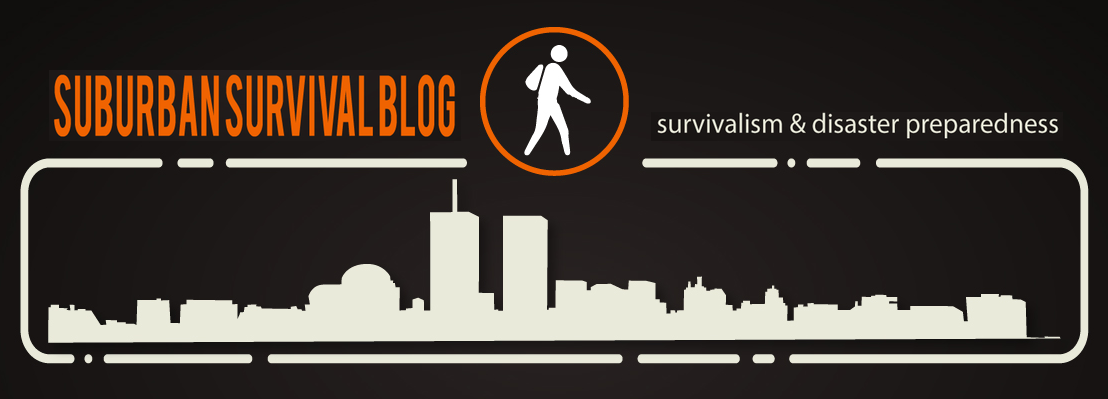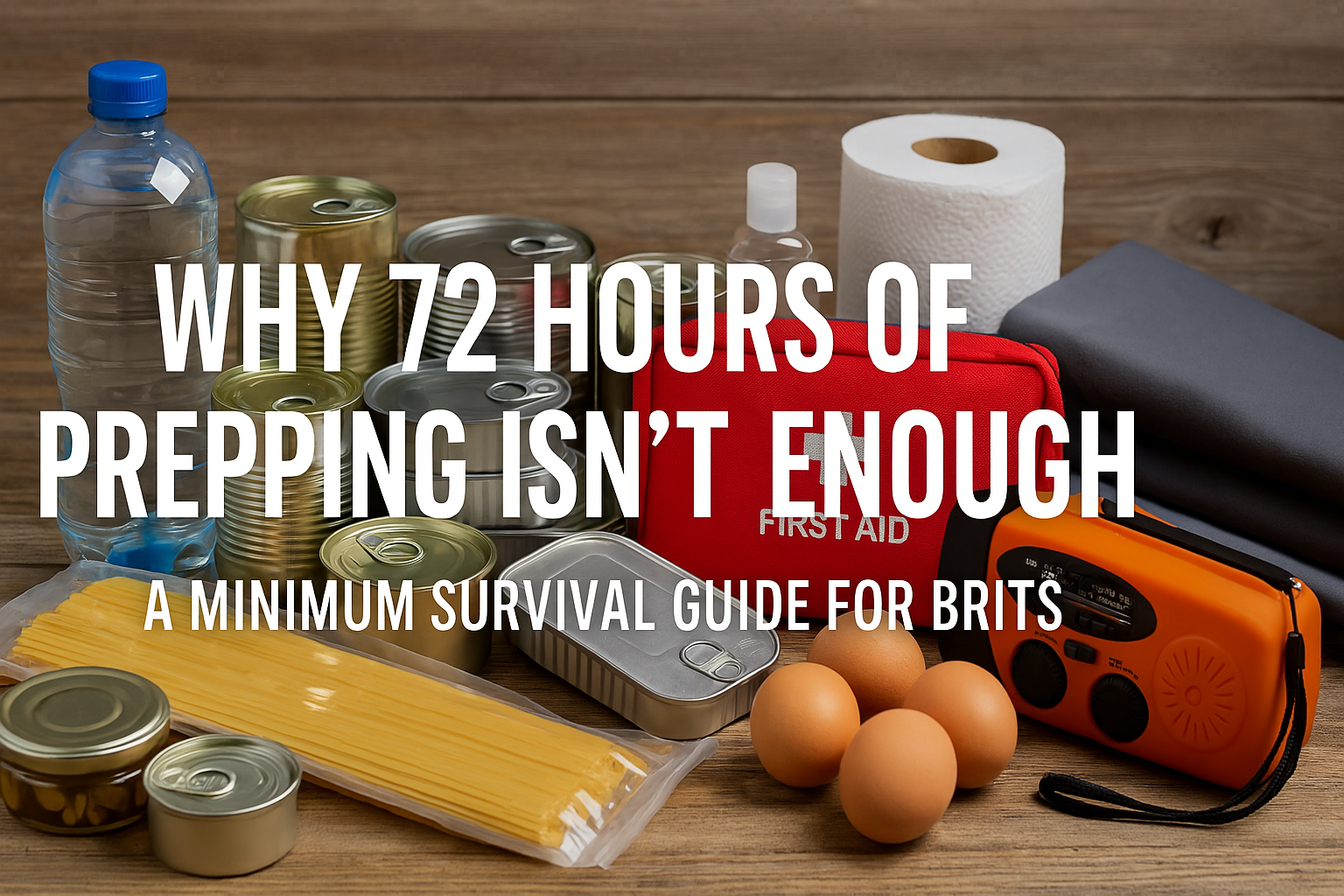Why is a Three-Month Food Storage Base Important?
It’s like this. You’re sitting on your couch, binge-watching the latest sitcom or show on Netflix, Apple TV, or Prime, when an emergency announcement interrupts. A mega-storm is on its way. (Replace with World War III is on the way if you like). Panic hits, you rush to the store for more toilet paper and paper towels, but holy crap (pun intended)! The shelves are already empty. Now, wouldn’t it be nice if you had a base of at least a three-month food storage base neatly stacked up at home? That’s right. No panic, no rush, just a calm assurance that your family will not starve in the short term in the event the mega-storm is worse than expected…
Having a three-month food storage base is like having a lifeboat when the ship sinks. For some of you reading this, you’re like “No S#!t…” I digress… A three-month food storage base provides a buffer that shields you and your family from immediate hunger in the face of disasters, both natural and man-made. From hurricanes to pandemics, job losses to extended power outages, a food storage base ensures you can sit out the crisis and wait for help or for things to return to normal.
Now, some might say, “But I have a week’s worth of groceries at home, isn’t that enough?” or “FEMA only recommends two weeks of food storage in the event of a disaster…” Well, in some cases, it might be enough food. But let’s be honest, when disaster strikes, a week is a drop in the bucket. And if you’re thinking about depending on your hunting or foraging skills, keep in mind that those supermarkets you see empty during a crisis,(?) They’re the modern equivalent of hunting and foraging grounds. When disaster strikes, everyone will be hunting and foraging. Those squirrels that run around your backyard… They’re stew for someone’s family, like it or not.
Assessing Your Family’s Nutritional Needs
Before we dive into the nuts and bolts (or should I say cans and packets?) of building your food storage base, let’s take a moment to talk about nutrition. Because, let’s face it, surviving on a diet of instant noodles and canned soup for three months isn’t the best idea unless your goal is to win the “Scurvy Survivor” award.
Your family’s nutritional needs will depend on a variety of factors, including age, gender, activity level, and any specific health conditions. A balanced diet typically includes carbohydrates, proteins, fats, vitamins, and minerals. While planning your food storage, try to include foods from all these categories.
Remember, in a survival scenario, two individuals or a married couple, for instance, may possess varying degrees of experience and skill, but this does not necessarily determine their chances of survival, as these can be remarkably equal. Even though one may be more skilled in areas of survival than the other can mean little without proper nutrition. This is because survival encompasses more than just the skills and knowledge one has accumulated. Although these are undeniably crucial elements, a vital factor comes into play: nutrition and daily calorie intake. To successfully navigate the challenges and obstacles posed by a survival situation, it is imperative to keep one’s body well-nourished and in good health. By doing so, an individual equips themselves with the energy and strength needed to persevere and ultimately survive.
Moreover, the mental and emotional components of survival should not be underestimated. Stress, fear, and anxiety can often play a significant role in survival scenarios, and an individual’s ability to manage these emotions can be just as crucial as their practical skills. Sometimes, a positive mindset and the ability to stay calm under pressure can make all the difference in a critical situation. So, while experience and skills are undoubtedly valuable, the importance of nutrition, mental fortitude, and emotional resilience cannot be overstated when it comes to surviving against the odds.
The Basics of Food Storage: Shelf Life and Rotation
Let’s talk about the life expectancy of your food storage, shall we? No, not in a “how long before it starts walking on its own” kind of way (though that’s important too), but in terms of the shelf life of the foods you’re storing.
Different foods have different shelf lives. Some foods, like canned goods and dried beans, can last for up to 20 — 30 years if stored properly. Others, like certain types of grains, might have a shorter shelf life. It’s important to understand the shelf life of each item in your food storage so that you can plan for rotation.
Rotation is the process of using older items before they expire and replacing them with fresh stock. It’s like a relay race, where the oldest can of beans passes the baton to the freshest can, ensuring a constant supply of edible food (and preventing any unexpected zombie food outbreaks).
Building Your Food Storage Base: Staple Foods and Non-Perishables
Now onto the fun part — or the part that feels like playing Tetris with cans and boxes, depending on how you look at it. Building your food storage base involves selecting staple foods and non-perishables that will form the backbone of your survival meals.
Staple foods are foods that form the basis of a diet — think rice, wheat, corn, and dried potatoes. These foods are usually carbohydrate-rich and provide a good deal of energy. They’re also usually quite filling.
Non-perishables, on the other hand, are foods that last a long time without spoiling. This includes foods like canned goods, dried foods, and foods preserved in oil or vinegar. The great thing about non-perishables is that they often also include a variety of fruits, vegetables, meats, and even dairy, allowing for a balanced diet even in survival situations.
The trick in building your food storage base is to find a balance between the two. You want to have enough staple foods to provide energy and satiety, but also a good variety of non-perishables to ensure nutritional balance.
Meal Planning With Your Food Storage Base
Meal planning with your food storage base is like playing Iron Chef in your kitchen, with the added challenge of limited ingredients and no option of running to the store. It’s about being creative with what you have and making sure that your meals meet your family’s nutritional needs.
Planning your meals ahead of time also helps in making sure that you use your food supplies efficiently. This means no waste and every meal counts. Creativity will also play a key role in your meals. You have to learn how to make the best out of what you have available while ensuring that each meal you prepare meets the nutritional needs of your family. This is crucial as proper nutrition plays a vital role in maintaining energy levels and overall health, which are paramount in a survival situation.
In addition to promoting creativity and ensuring nutritional needs are met, planning your meals ahead of time also helps you use your food supplies efficiently. When we say efficiently, we mean that you minimize waste and ensure that every meal prepared counts. Wasting food is not an option when you’re in survival mode.
Now, it’s important to note that when you’re in a survival situation, being picky about your food is a luxury you can’t afford. However, this doesn’t mean you’re resigned to eating bland and unappetizing meals. With proper planning, you can have a variety of tasty and nutritious meals that will not only sustain you but also lift your spirits. Food, after all, can be a great comfort in challenging times.
Note that when building your food storage plan, you should take into account the common spices you enjoy when cooking today… Don’t underestimate the mental and moral boost you can get from familiar and comforting smells and tastes during stressful situations
Remember, a survival situation is not the time to be picky. But that doesn’t mean your meals have to be boring. With a bit of planning, you can still have a variety of tasty and nutritious meals.
Storing and Organizing Your Food Storage Supplies
Now that you’ve got your food supplies, where do you put them all? Storing and organizing your food storage supplies is like playing hide and seek with cans and packets. But instead of seeking, you’re making sure that everything is easy to find and access when needed.
Proper storage is crucial to ensure the longevity and safety of your food supplies. This means storing food in a cool, dry place, away from sunlight and extreme temperatures.
Organizing your supplies makes it easier to keep track of what you have and what you need. It also makes it easier to rotate your stock and ensure that nothing goes to waste.
Tips for Budget-Friendly Food Storage
Building a three-month food storage base can be a bit of a strain on the wallet. But it doesn’t have to be. You can build it yourself or go to someplace like My Patriot Supply and simply purchase a three-month supply of food. Although, if you do, you may want to augment it with other foods you can enjoy alongside it if you need to dig into it… With a few smart strategies, you can build your food storage without breaking the bank.
First, look to buy in bulk. This is often cheaper than buying smaller quantities. I.e. that 50lb bag of rice at Costco or Sam’s Club will cost much less than 25 2lb bags overall… Second, look for sales and discounts. You’d be surprised at how much you can save this way. Third, consider growing your food. Even a small vegetable garden can provide a valuable addition to your food storage.
Remember, food storage is not a one-time expense. It’s a continuous investment in your family’s safety and well-being for the long term, should you need it.
Essential Equipment for Food Storage
In addition to the food items that you will store, it is also vital to have the right equipment on hand to ensure your food storage is efficient and easy to use. The necessity of proper equipment cannot be overstated; think of it as having the right tools for the job, which can significantly simplify the process.
First and foremost, you will need containers for storing your bulk items. These containers should be airtight to protect the food from pests and moisture, which can cause spoilage. You might consider investing in food-grade buckets or glass jars with tight-fitting lids to store items like grains, beans, and pasta.
A reliable can opener is another essential tool, especially if you have a significant amount of canned goods in your storage. It might seem like a small thing, but trying to open a can without a can opener in a survival situation would be frustrating and potentially dangerous. Therefore, having a few can openers, including a manual one, is a wise decision.
If you have opted to store whole grains, a manual grain mill is a valuable piece of equipment to consider. Whole grains have a longer shelf life compared to their processed counterparts, but they need to be ground before consumption. A manual grain mill would allow you to grind grains into flour for baking bread, making porridge, or other uses. Having this ability adds versatility to your food storage, giving you more options for meal preparation.
While the food itself is undoubtedly the star of your food storage, having the right equipment can make a world of difference in terms of efficiency and ease of use. Investing in the proper containers, can openers, and perhaps a manual grain mill will go a long way in ensuring that your food storage meets your needs and expectations.
Food Storage for Specific Dietary Restrictions
If you or any member of your family has specific dietary restrictions, don’t worry. Building a three-month food storage base can still be done. It just requires a bit more planning and consideration.
For example, if you’re gluten intolerant, you might want to store rice and corn instead of wheat. If you’re vegan, you’ll want to focus on plant-based proteins like beans and lentils.
The goal is to ensure that everyone in your family can eat healthy, balanced meals, regardless of any dietary restrictions.
Having a Solid Three Months of Supplies and Skills is (IMHO) Crucial Before Scaling Up to Longer-Term Preparedness Goals
When you have successfully built up a three-month food storage base, pat yourself on the back, for you have laid a solid foundation essential for survival. But remember, this is just the beginning of your preparedness journey. Securing a robust three-month supply of essentials, coupled with the necessary skills, is a pivotal step that must be in place before you can confidently move on to achieving longer-term preparedness goals.
It is crucial to approach the process of building a comprehensive food storage base with the mindset that it is akin to running a marathon, not a sprint. The journey to being fully prepared is incremental and should not be rushed. It is not something that can be accomplished in one fell swoop.
To make the process more manageable, it is advisable to set realistic and achievable goals. Take each step one at a time, and be patient with yourself as you work towards building up your supplies. It is important to remember that preparedness is not a race. The goal is not to be the fastest but to be thorough and meticulous in your planning and execution. With dedication, consistency, and a clear plan, you will find that you are well-equipped and ready to face whatever challenges may come your way.
Replenishing and Maintaining Your Food Storage Base
Once you’ve built your food storage base, the work isn’t over. In fact, it’s just beginning. Replenishing and maintaining your food storage base is an ongoing process, like mowing the lawn or doing the dishes.
This involves regularly checking your supplies, rotating your stock, and replacing any items that have been used or that are nearing their expiration date.
Remember, a well-maintained food storage base is an effective food storage base. It’s not just about having supplies, it’s about having usable supplies.
Three Months of Food Storage is Portable
One of the strategic benefits of having three-month food storage is its portability, which is crucial in situations where you might need to evacuate your home for an extended period. This mobility aspect ensures that you have the essential food supplies you need to sustain yourself and your family until you reach your bug-out location or an alternative safe destination.
When we talk about portability, we mean that your food storage should be organized and packaged in a way that makes it easy to load into a vehicle, such as an SUV, along with your bug-out bags and other essential survival gear. This requires a bit of preplanning to ensure that your food supplies are not only properly sealed and protected but also packed in containers that are easy to handle and transport.
To maximize the portability of your food storage, consider using containers such as plastic bins, sturdy boxes, or even large duffel bags to organize and pack your food supplies. These containers should be clearly labeled and organized in a way that allows you to quickly and efficiently load them into your vehicle. The goal is to be able to evacuate your home and be on the road as quickly as possible, with the confidence that you have the necessary food supplies to sustain you and your family during the evacuation.
Furthermore, when preparing your food storage for portability, it is essential to consider the types of food you are storing. Opt for lightweight, non-perishable, and easy-to-prepare food items that won’t take up too much space and can be easily transported. Canned goods, dried fruits, nuts, granola bars, and freeze-dried meals are excellent options to consider for your portable food storage.
Having a portable three-month food storage can be important and an integral part of your preparedness plan depending on your geography. It provides you with the flexibility and assurance that you will have the necessary food supplies during an evacuation, enabling you to focus on reaching your bug-out location or alternative destination safely. With careful planning and organization, you can ensure that your food storage is ready to go when you need it most.
Conclusion: Peace of Mind for Any Situation
Building a three-month food storage base may seem like a daunting task. But with a bit of planning, a dash of organization, and a sprinkle of perseverance, it’s an achievable goal. And the peace of mind it provides is worth every effort.
In the end, a three-month food storage base is more than just a pile of cans and packets. It’s a lifeline in uncertain times. It’s the assurance that no matter what happens, you and your family will have the means to survive. And that, my friend, is priceless.
So whether you’re a seasoned prepper or a beginner just starting out, I hope this guide has provided you with some valuable insights and practical tips. Remember, preparedness is not about living in fear, it’s about living with peace of mind. So get started on your food storage base today, and ensure your family’s well-being in any situation.









The short / simple means to long term store 2000 calories per person for a year (a sedentary diet) is 66 #10 cans (11 cases) of LDS rice, and 22 #10 cans (say 4 cases) of LDS beans.
With a 30 year shelf life this preliminary acquisition allows time to develop a family specific plan.
A standard case of six cans measures 8.5″ x 13″ x 19″, 15 cases stacked long dimension out from your wall would be three wide and five high, 39″ wide by 42.5″ high. Net weights:
LDS rice cans 5.4 lbs, so if buying equivalent rice in say sacks it would be 356.4 lbs.
LDS black bean cans 5.5 lbs, so if buying equivalent beans in sacks it would be 121 lbs.
A total of 477.4 lbs.
The ratio of rice to beans is based on a theory of complimentary proteins. Elsewhere the argument is made for more calories, protein, other nutrition, etc. to reach a suggested per day calorie for folks working of around 3,800 calories.
As a general rule the storage life of most foods is cut in half by every increase of 18º F (10º C). For example, if you’ve stored your food in a garage at 90º F (32º C) you should expect a shelf life of about half what could be obtained perhaps in your pantry at 70º F (21º C), which in turn is half the storage life that you could get if you kept it in your basement or refrigerator at 50º F (10º C). With this rationale one might guess that an idea storage temperature would be in the high 30’s F, i.e. 38ºF (3.3ºC).
Hey Noah, all good points. And you are likely correct, the real ideal temperature for food storage would probably be below 40 degrees Fahrenheit. I’m not sure how realistic that is though, one would have to have or build a solid root cellar for that, and/or install a walk in cooler in their basement, garage, etc. A bit cost prohibitive (the cooler that is…) Where I live we neither have the root cellar or a basement, and that makes it difficult to manage large quantities of food storage both due to the storage space and due to the climate in the summer… Much is used and rotated for that reason.